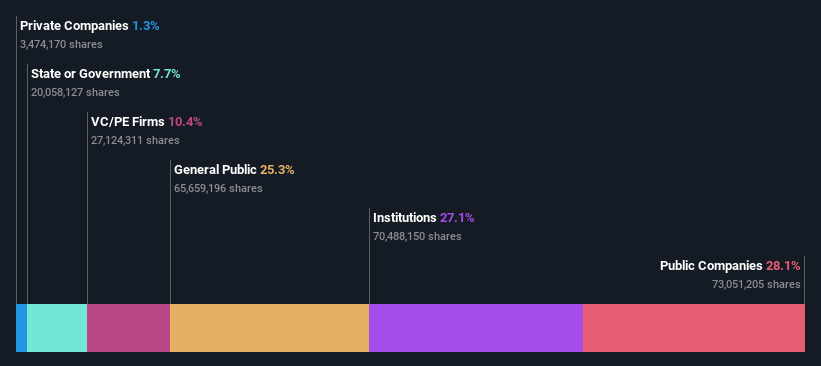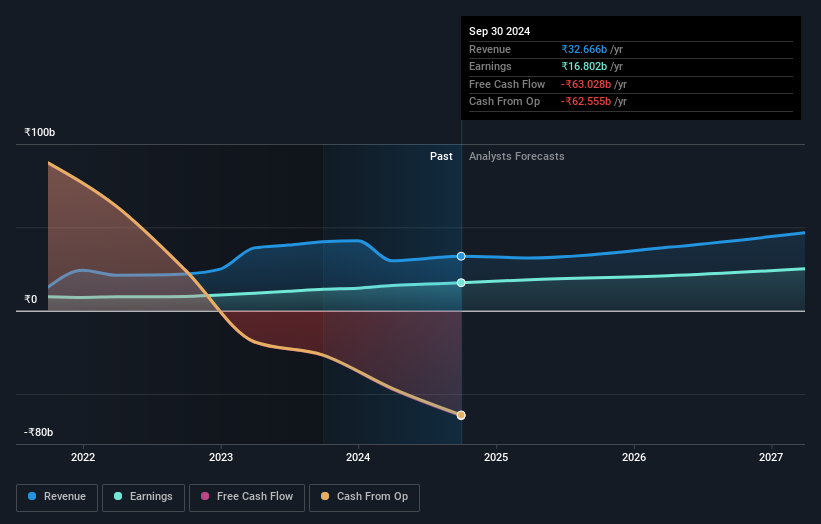- India
- /
- Diversified Financial
- /
- NSEI:PNBHOUSING
Both public companies who control a good portion of PNB Housing Finance Limited (NSE:PNBHOUSING) along with institutions must be dismayed after last week's 9.8% decrease

Key Insights
- The considerable ownership by public companies in PNB Housing Finance indicates that they collectively have a greater say in management and business strategy
- A total of 5 investors have a majority stake in the company with 51% ownership
- Institutions own 27% of PNB Housing Finance
Every investor in PNB Housing Finance Limited (NSE:PNBHOUSING) should be aware of the most powerful shareholder groups. The group holding the most number of shares in the company, around 28% to be precise, is public companies. Put another way, the group faces the maximum upside potential (or downside risk).
While institutions, who own 27% shares weren’t spared from last week’s ₹23b market cap drop, public companies as a group suffered the maximum losses
Let's take a closer look to see what the different types of shareholders can tell us about PNB Housing Finance.
See our latest analysis for PNB Housing Finance

What Does The Institutional Ownership Tell Us About PNB Housing Finance?
Institutional investors commonly compare their own returns to the returns of a commonly followed index. So they generally do consider buying larger companies that are included in the relevant benchmark index.
As you can see, institutional investors have a fair amount of stake in PNB Housing Finance. This can indicate that the company has a certain degree of credibility in the investment community. However, it is best to be wary of relying on the supposed validation that comes with institutional investors. They too, get it wrong sometimes. When multiple institutions own a stock, there's always a risk that they are in a 'crowded trade'. When such a trade goes wrong, multiple parties may compete to sell stock fast. This risk is higher in a company without a history of growth. You can see PNB Housing Finance's historic earnings and revenue below, but keep in mind there's always more to the story.

PNB Housing Finance is not owned by hedge funds. Punjab National Bank is currently the company's largest shareholder with 28% of shares outstanding. The Carlyle Group Inc. is the second largest shareholder owning 10% of common stock, and Singapore holds about 6.4% of the company stock.
Our research also brought to light the fact that roughly 51% of the company is controlled by the top 5 shareholders suggesting that these owners wield significant influence on the business.
While studying institutional ownership for a company can add value to your research, it is also a good practice to research analyst recommendations to get a deeper understand of a stock's expected performance. There are plenty of analysts covering the stock, so it might be worth seeing what they are forecasting, too.
Insider Ownership Of PNB Housing Finance
While the precise definition of an insider can be subjective, almost everyone considers board members to be insiders. Management ultimately answers to the board. However, it is not uncommon for managers to be executive board members, especially if they are a founder or the CEO.
I generally consider insider ownership to be a good thing. However, on some occasions it makes it more difficult for other shareholders to hold the board accountable for decisions.
We note our data does not show any board members holding shares, personally. Given we are not picking up on insider ownership, we may have missing data. Therefore, it would be interesting to assess the CEO compensation and tenure, here.
General Public Ownership
The general public-- including retail investors -- own 25% stake in the company, and hence can't easily be ignored. While this group can't necessarily call the shots, it can certainly have a real influence on how the company is run.
Private Equity Ownership
With a stake of 10%, private equity firms could influence the PNB Housing Finance board. Sometimes we see private equity stick around for the long term, but generally speaking they have a shorter investment horizon and -- as the name suggests -- don't invest in public companies much. After some time they may look to sell and redeploy capital elsewhere.
Public Company Ownership
Public companies currently own 28% of PNB Housing Finance stock. We can't be certain but it is quite possible this is a strategic stake. The businesses may be similar, or work together.
Next Steps:
It's always worth thinking about the different groups who own shares in a company. But to understand PNB Housing Finance better, we need to consider many other factors. For instance, we've identified 1 warning sign for PNB Housing Finance that you should be aware of.
If you would prefer discover what analysts are predicting in terms of future growth, do not miss this free report on analyst forecasts.
NB: Figures in this article are calculated using data from the last twelve months, which refer to the 12-month period ending on the last date of the month the financial statement is dated. This may not be consistent with full year annual report figures.
New: Manage All Your Stock Portfolios in One Place
We've created the ultimate portfolio companion for stock investors, and it's free.
• Connect an unlimited number of Portfolios and see your total in one currency
• Be alerted to new Warning Signs or Risks via email or mobile
• Track the Fair Value of your stocks
Have feedback on this article? Concerned about the content? Get in touch with us directly. Alternatively, email editorial-team (at) simplywallst.com.
This article by Simply Wall St is general in nature. We provide commentary based on historical data and analyst forecasts only using an unbiased methodology and our articles are not intended to be financial advice. It does not constitute a recommendation to buy or sell any stock, and does not take account of your objectives, or your financial situation. We aim to bring you long-term focused analysis driven by fundamental data. Note that our analysis may not factor in the latest price-sensitive company announcements or qualitative material. Simply Wall St has no position in any stocks mentioned.
About NSEI:PNBHOUSING
Solid track record and fair value.
Similar Companies
Market Insights
Community Narratives



